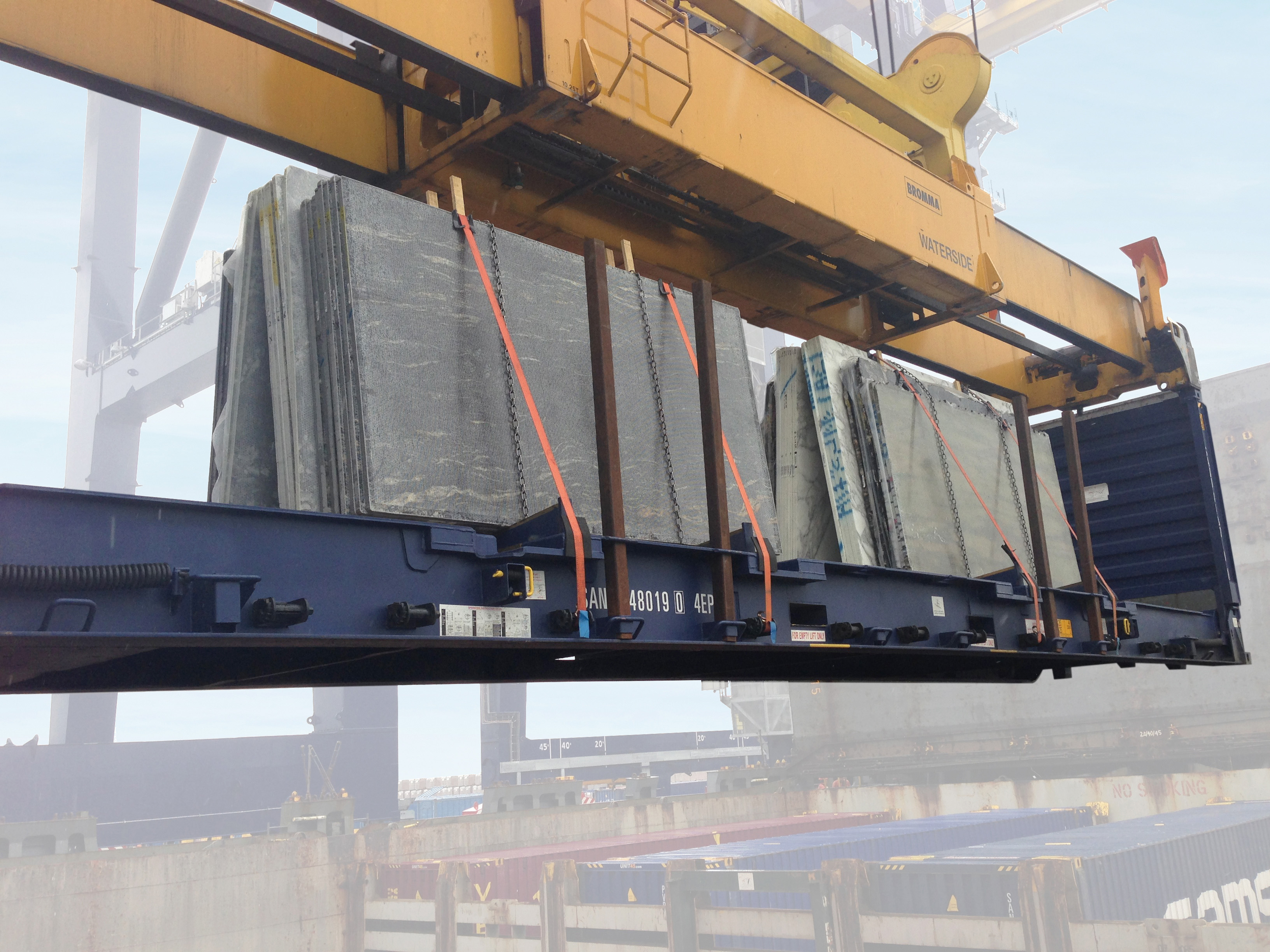Stone Logistics : Samskip
If you are buying from Europe and want to arrange your own transport, Samskip offers a specialist solution for the stone industry.
Stone slabs are heavy, bulky and brittle, which makes them difficult to transport, especially when they need to be transferred from lorries to trains to boats and back to lorries. But Samskip has made a speciality of doing that.
Samskip is a logistics company based in Rotterdam (the largest container port in Europe) with offices and agents in various countries including the UK.
In England, it is based at Wherstead, Ipswich, a few miles along the A14 from Felixstowe, which is one of the UK’s main container ports. The Wherstead office is where Sales Manager Tom Reid is based.
 Tom explains that logistics are often about reducing handling, especially when dealing with something like slabs of stone that can be relatively easily chipped and cracked. Samskip believes that since it introduced last year its new fleet of 35 multimodal 40ft (12m) A-frame flat-racks designed specifically for the transportation of stone on lorries, trains and boats, it has eliminated the risk of damage in transport.
Tom explains that logistics are often about reducing handling, especially when dealing with something like slabs of stone that can be relatively easily chipped and cracked. Samskip believes that since it introduced last year its new fleet of 35 multimodal 40ft (12m) A-frame flat-racks designed specifically for the transportation of stone on lorries, trains and boats, it has eliminated the risk of damage in transport.
These multimodal flat-racks were developed in conjunction with customers in the stone sector and have proved a significant success. Samskip now carries materials for a good number of stone companies in Europe and the UK, including wholesaler The Marble & Granite Centre in Rickmansworth, which has a weekly delivery from Samskip.
Proprietor Stephen Pike says: “Safety is paramount and Samskip’s flat-racks make unloading straight forward. They also mean the stone does not have to be re-handled on route, so it does not get damaged. Timeliness is vital and Samskip don’t let us down. We couldn’t ask for better service from them, which means we can also give our customers the level of service that keeps them coming back to us.”
The flat-racks have ends that allow the units to be stacked on top of each other like containers. They are lifted from above, making them easy to handle in the same way as containers. And a significant development was including secure, built-in but fold-down A-frame sections, so the same racks can be used to transport slabs, crates and pallets.
The open tops and sides provide easy access for loading and unloading, as not every company has the lifting gear necessary to unload containers.
But the fact that the ends and the A-frames can fold down into the surface of the unit provides a solution for another important element of logistics: minimising empty movements. “The whole challenge is reducing the empty kilometres,” says Tom.
Because a lot more stone comes into the UK than is exported from it, flat-racks go back to the mainland empty (usually to Italy but some to Portugal). The problem of empty kilometres is not exclusive to the UK or Samskip. It is an issue that all freight transporters attempt to tackle.
The fold flat aspect of Samskip’s flat-racks means that although they do have to be returned unloaded, they can be folded flat and stacked on top of each other, so five can be returned at a time, at least reducing the number of empty movements. That keeps the price down for customers.
And price is the point. Importers can leave it to suppliers to arrange to deliver the stone but that means that cost element is out of their hands – and many importers would rather be in control of it.
If time is of the essence, it is always going to be quicker to load a lorry and drive the stone to the UK from anywhere on mainland Europe. It takes Samskip seven days door-to-door from Italy but it claims an impressive record of on-time delivery.
Samskip’s aim is carbon reduction and it has its own trains and 10 weekly ship departures to the UK from the Continent, with two more to Ireland. Reducing carbon is not only good for the environment, it is also less expensive.
Tom says Samskip is already bringing a lot of stone into the UK, but it is still a small part of the company’s business. There has been a bigger business over the past few years in importing bricks, following the shutting down of so many brick kilns in the UK after 2008/9. However, that is falling again as brickworks re-open in the UK. Samskip’s main business is carrying steel, ketchup, breakfast cereals and other foods. And beer – a lot of beer.
Samskip is a global logistics company with 43 offices worldwide, employing 1,300 people, about 300 of them at the company’s headquarters in Rotterdam and 30 in the UK at Wherstead.
Samskip has more than 16,000 container units of all kinds in its fleet. It has its own rail terminal and owns a wide range of vessels, trucks and trailers in order to offer the right equipment for the cargo being shipped. Two of its Damen short sea vessels specifically bring goods across the Channel to the UK, although it also uses other ships that it charters on the open market for journeys.
All that gives it a turnover of more than €350million a year – with the UK its largest single market.
The transportation of stone is nothing new to Samskip but it is the investment in its new units that has launched Samskip’s stone carrying service on to a new level.
And it is a sector Tom likes working in. “What I really like about it is that these guys are down to the ground. They appreciate our expertise and experience but you can sit down and talk to them – even if it’s about football. They’re so pleasant to work with. It’s good to be involved with a product as prestigious as stone and be able to say you’re in that market.”
With the world economy still subdued and there being no shortage of competition among logistics companies, having a foothold in a niche area such as stone gives Tom a certain confidence.

